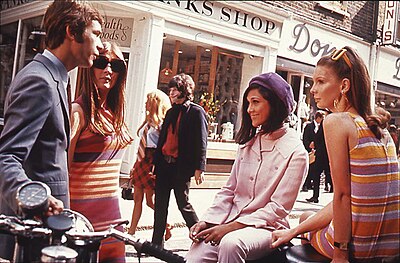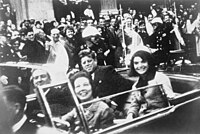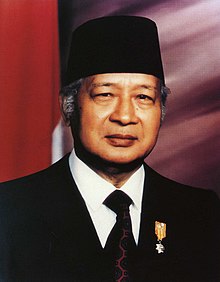Portal:1960s
The 1960s Portal
The 1960s became synonymous with the new, radical, and subversive events and trends of the period. In Africa the 1960s was a period of radical political change as 32 countries gained independence from their European colonial rulers. Some commentators have seen in this era a classical Jungian nightmare cycle, where a rigid culture, unable to contain the demands for greater individual freedom, broke free of the social constraints of the previous age through extreme deviation from the norm. Christopher Booker charts the rise, success, fall/nightmare and explosion in the London scene of the 1960s. However, this alone does not explain the mass nature of the phenomenon. Several nations such as the U.S., France, Germany and Britain turned to the left in the early and mid 1960s. In the United States, John F. Kennedy, a Keynesian and staunch anti-communist, pushed for social reforms. His assassination in 1963 was a stunning shock. Liberal reforms were finally passed under Lyndon B. Johnson including civil rights for African Americans and healthcare for the elderly and the poor. Despite his large-scale Great Society programs, Johnson was increasingly reviled by the New Left at home and abroad. The heavy-handed American role in the Vietnam War outraged student protestors across the globe, as they found peasant rebellion typified by Ho Chi Minh and Che Guevara more appealing. Italy formed its first left-of-center government in March 1962 with a coalition of Christian Democrats, Social Democrats, and moderate Republicans. Socialists joined the ruling block in December 1963. In Britain, the Labour Party gained power in 1964. In Brazil, João Goulart became president after Jânio Quadros resigned. This is a Featured article, which represents some of the best content on English Wikipedia..
The Freewheelin' Bob Dylan is the second studio album by American singer-songwriter Bob Dylan, released on May 27, 1963, by Columbia Records. Whereas his self-titled debut album Bob Dylan had contained only two original songs, this album represented the beginning of Dylan's writing contemporary lyrics to traditional melodies. Eleven of the thirteen songs on the album are Dylan's original compositions. It opens with "Blowin' in the Wind", which became an anthem of the 1960s, and an international hit for folk trio Peter, Paul and Mary soon after the release of the album. The album featured several other songs which came to be regarded as among Dylan's best compositions and classics of the 1960s folk scene: "Girl from the North Country", "Masters of War", "A Hard Rain's a-Gonna Fall" and "Don't Think Twice, It's All Right". Dylan's lyrics embraced news stories drawn from headlines about the ongoing civil rights movement and he articulated anxieties about the fear of nuclear warfare. Balancing this political material were love songs, sometimes bitter and accusatory, and material that features surreal humor. Freewheelin' showcased Dylan's songwriting talent for the first time, propelling him to national and international fame. The success of the album and Dylan's subsequent recognition led to his being named as "Spokesman of a Generation", a label Dylan repudiated. (Full article...)This is a Good article, an article that meets a core set of high editorial standards.
The February 1969 nor'easter was a severe winter storm that affected the Mid-Atlantic and New England regions of the United States between February 8 and February 10. The nor'easter dropped paralyzing snowfall, exceeding 20 in (51 cm) in many places. New York City bore the brunt of the storm, suffering extensive disruption. Thousands of travelers became stranded on roads and in airports. The storm killed at least 94 people. City schools were closed for several days and some areas of the city remained uncleared for over a week. New York Mayor John Lindsay was criticized for failing to respond to the snowstorm adequately. (Full article...) Selected picture - In the 1960s, Carnaby Street in London was the center for trends and fashions.
Did you know -
Related portalsThis is a Featured article, which represents some of the best content on English Wikipedia..
Sir James Paul McCartney CH MBE (born 18 June 1942) is an English singer, songwriter and musician who gained worldwide fame with the Beatles, for whom he played bass guitar and shared primary songwriting and lead vocal duties with John Lennon. One of the most successful composers and performers of all time, McCartney is known for his melodic approach to bass-playing, versatile and wide tenor vocal range, and musical eclecticism, exploring genres ranging from pre–rock and roll pop to classical, ballads, and electronica. His songwriting partnership with Lennon is the most successful in modern music history. Born in Liverpool, McCartney taught himself piano, guitar, and songwriting as a teenager, having been influenced by his father, a jazz player, and rock and roll performers such as Little Richard and Buddy Holly. He began his career when he joined Lennon's skiffle group, the Quarrymen, in 1957, which evolved into the Beatles in 1960. Sometimes called "the cute Beatle", McCartney later immersed himself in the London avant-garde scene and played a key role in incorporating experimental aesthetics into the Beatles' studio productions. Starting with the 1967 album Sgt. Pepper's Lonely Hearts Club Band, he gradually became the band's de facto leader, providing creative impetus for most of their music and film projects. Many of his Beatles songs, including "And I Love Her", "Yesterday", "Eleanor Rigby", and "Blackbird", rank among the most covered songs in history. Although primarily a bassist with the Beatles, he played a number of other instruments, including keyboards, guitars, and drums, on various songs. (Full article...)This is a Good article, an article that meets a core set of high editorial standards.
Suharto (/suːˈhɑːrtoʊ/ soo-HAR-toh, Indonesian: [suˈharto] ⓘ; 8 June 1921 – 27 January 2008) was an Indonesian military officer and politician, who served as the second and the longest serving President of Indonesia. Widely regarded as a military dictator by international observers, Suharto led Indonesia as an authoritarian regime from the fall of his predecessor Sukarno in 1967 until his resignation in 1998 following nationwide unrest. His 31-year dictatorship is considered one of the most brutal and corrupt of the 20th century, as he was central to the perpetration of mass killings against alleged communists, ethnic Chinese, irreligious people and trade unionists. Suharto was born in the small village of Kemusuk, in the Godean area near the city of Yogyakarta, during the Dutch colonial era. He grew up in humble circumstances. His Javanese Muslim parents divorced not long after his birth, and he lived with foster parents for much of his childhood. During the Japanese occupation era, Suharto served in the Japanese-organized Indonesian security forces. During Indonesia's independence struggle, he joined the newly formed Indonesian Army. There, Suharto rose to the rank of major general some time after full Indonesian independence was achieved. (Full article...)Selected article - The 1968 United States presidential election was the 46th quadrennial presidential election, held on Tuesday, November 5, 1968. The Republican nominee, former vice president Richard Nixon, defeated both the Democratic nominee, incumbent vice president Hubert Humphrey, and the American Independent Party nominee, former Alabama governor George Wallace. This was the last election until 1988 in which the incumbent president was not on the ballot. This is the most recent election where a third-party candidate won an electoral vote. Incumbent president Lyndon B. Johnson had been the early front-runner for the Democratic Party's nomination, but he withdrew from the race after only narrowly winning the New Hampshire primary. Eugene McCarthy, Robert F. Kennedy and Humphrey emerged as the three major candidates in the Democratic primaries until Kennedy was assassinated. His death after midnight on June 6, 1968, continued a streak of high-profile assassinations in the 1960s. Humphrey edged out anti-Vietnam war candidate McCarthy to win the Democratic nomination, sparking numerous anti-war protests. Nixon entered the Republican primaries as the front-runner, defeating liberal New York governor Nelson Rockefeller, conservative governor of California Ronald Reagan, and other candidates to win his party's nomination. Alabama's Democratic former governor, George Wallace, ran on the American Independent Party ticket, campaigning in favor of racial segregation on the basis of "states’ rights". The election year was tumultuous and chaotic. It was marked by the assassination of Martin Luther King Jr. in early April, and the subsequent 54 days of riots across the nation, by the assassination of Robert F. Kennedy in early June, and by widespread opposition to the Vietnam War across university campuses. Vice President Hubert Humphrey won and secured the Democratic nomination, with Humphrey promising to continue Johnson's war on poverty and to support the civil rights movement. (Full article...)More Did you know (auto generated)
TopicsCategoriesWikiProjects
Associated WikimediaThe following Wikimedia Foundation sister projects provide more on this subject:
Discover Wikipedia using portals |





























